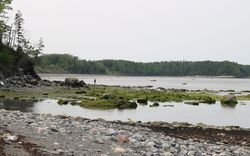For the first iteration of River, Shore, Land: Ecological Futures at the Jardins de Métis, a three-year thematic series facilitated through the CCA Master’s Students Program, participants of the 2023 cohort engaged in a collaborative research to explore and support how the Jardins de Métis/Reford Gardens are contending with a changing local climate. The Jardins de Métis is a landmark horticultural laboratory that for decades has set an agenda for international landscape design. This series focuses on the site’s changing local conditions through its connections to the Mitis River, the shoreline of the Saint-Lawrence River, and their surrounding territorial ties to what is now known as Gaspésie.
Over the course of the summer, students developed a collective project anchored by this state of ecological flux, occasioned both by the effects of global warming as well as the short- and long-term consequences of farming, mining, and other local extractive industries. Grand-Métis, Quebec, thus became a microcosm to reflect on the broader ecological futures of shoreline erosion, depleting aquifers, soil exhaustion, and other manifestations of a rapidly changing ecology. The focus for this first year was on the Mitis River and its important role as a gathering place and site of invitation for surrounding communities, in particular members of the Wolastoqiyik community.
Located on the eastern shore of the Mitis River, and so on the ancestral territories of the Wolastoqiyik and the Mi’gmaq, the Jardins de Métis served as a space of dialogue and community engagement hosting the students for a one-month research residency. At the end of June, a gathering event was organized by the students at the mouth of the Mitis River, to begin to trace, collect, and share materials, stories, and potential futures of the River and its surrounding ecologies. In July and August, the students were in residency at the CCA to pursue their collaborative research project and participate in events and conversations with other researchers. In a web article, they reflect on the role of invitation as a process for researching and designing with river places, and invite the reader to consult the website and the downloadable file they created to share their research.

